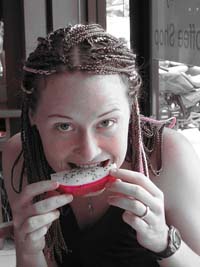Christopher Moore: Lamb
I can easily say that Lamb was not only the funniest book I have ever read but also one of the best. I came across Christopher Moore in a book store one day, read the dust jacket and promptly headed off to the library to pick him up. I really don't know how it is that it took me this long to learn about him but I'm sure glad I did.
Lamb is the story of Christ, told by his childhood pal, Biff. It not only addresses his childhood, and eventual crucifixion but also the missing years in between his teaching in the temple and his eventual return to Nazareth. It features Mary Magdalene (Maggie), Joseph of Arimetheas, the apostles, a yeti, some yaks, Chinese concubines and some demons. "Levi known as Biff" narrates the tale of how he and Joshua (Jesus) head off to China and India during the missing years. They spend time with Buddhist monks, untouchables (Jesus finds great joy in poking all the untouchables he can - the irony is just too much for him)and learn all kinds of skills in their search for the three wise men.
Here are some of my favorite parts:
- After polishing off six Chinese concubines, the Demon Catch says to Biff "Hey kid, you're a Jew, aren't you? It's been a long time since I've eaten a Jew. A good Jew sticks to your ribs. That's the problem with Chinese, you eat six or seven of them and in half an hour you're hungry again."
- Joshua refused to take up any of the weapons, in fact, he refused to practice any art that would bring harm to another human being. Two of the monks devised for Joshua a regimen of weaponless fighting that involved no offense or striking at all, but instead channeled the energy of an attacker away from oneself. Since the new art was practices only by Joshua , the monks called it Jew-do, meaning the way of the Jew.
- "Josh, look! That guy is trying to lick his own balls! Just like Bartholomew, the village idiot. These are my people, Josh. These are my people. I have found home."
-The Kama Sutra sayeth: When a man applies wax from the carnuba bean to a woman's yoni and buffs it with a lint-free cloth or a papyrus towel until a mirror shine is achieved, then it is called "Readying the Mongoose for Trade-In."
- Shortly after the visage of Mary appears on a wall, Biff believes he sees her face again:
"Look, there's another message from your mother!"
"That's not my mother."
"But look, in the elephant poop, it's a woman's face."
"I know, but it's not my mother. It's distorted because of the medium. It doesn't even look like her. Look at the eyes."
"I guess you're right. The medium obscured the message."
I could go on and on with little snippets from this book. I was laughing out loud every couple of pages, and for a book to make me laugh out loud is pretty rare. I can't wait to read more Christopher Moore.

